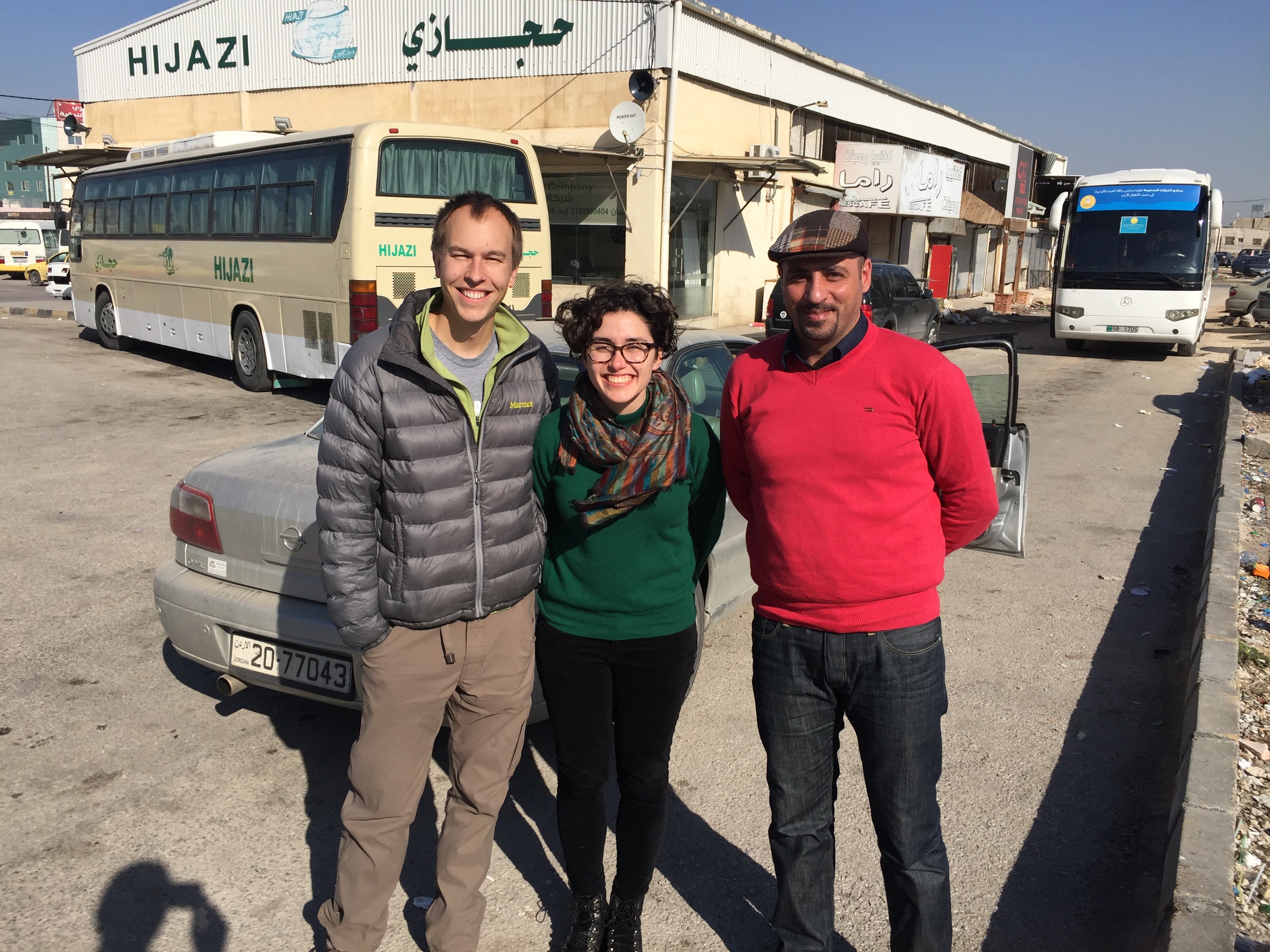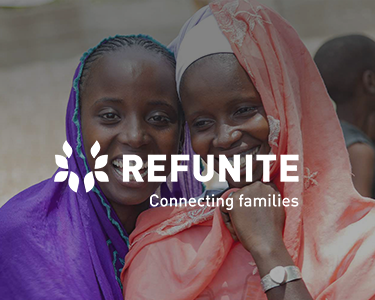
In this blog post, REFUNITE’s Middle East Project Manager, Sacha Robehmed, reflects on her recent trip to Jordan, where her and Product Manager, Vytas Bradunas, conducted research on technology and the need for a family tracing service like REFUNITE’s in the region.
Syrians With Smartphones – Where Does REFUNITE Fit In?
Updates From Our Recent Research Trip to Jordan
*For security reasons, some names have been changed to protect the identities of the interviewees mentioned in this story.

First steps
REFUNITE launched campaigns in Jordan, and more recently in Turkey and Iraq , trying to reach Syrian refugees (there are almost 3.4 million Syrian registered refugees in these 3 countries, with over 4.5 million Syrian refugees registered in the Middle East). Given these previous campaigns, we wanted to find out whether there really is a need for REFUNITE among the almost 10 million displaced Syrians. We started our research with the 635,000 registered Syrian refugees in Jordan. Our former CTO Julie Rix had carried out some preliminary research in Jordan’s Zaatari refugee camp in 2014, too. Going into the trip, we expected to find a population different from those we serve in East Africa, but we weren’t sure in what way. Our ultimate goal was identifying these differences and examining what this means for REFUNITE in the region.

In the first week, Vytas, our Product Manager, spoke with refugees living in three locations: Jordan’s capital city Amman, Zaatari refugee camp – which is home to more than 79,000 Syrian refugees, and Irbid – a town in northern Jordan where so many Syrians from Deraa have moved, that they call it “little Deraa”. I joined Vytas for the second week of January, as we sought to speak to more refugees in northern Jordan, specifically in the cities of Irbid, Mafraq, and Ramtha, as well as in the surrounding countryside. All the areas we visited were within 20km of the border with Syria. We interviewed 20 people, from whom we heard multiple stories of when and how they arrived in Jordan and their hopes for the future. Most of the people we interviewed wanted to eventually be resettled to Canada. Our conversations focused on cell phone access and use, as well as missing family members.

Initial findings: Syrians are highly connected
At REFUNITE, we believe everyone has the right to know where their family is. Speaking with Syrians in Jordan, we quickly realized that everyone we met was highly connected, especially with their families. Almost all interviewees had a smartphone and SIM card with access to data. One young university student, on a tight budget, had data but no credit to make calls. He used an application called IMO to speak with his parents who had stayed back in his home town of Deraa. This was cheaper than using regular phone calls.

Syrians are sophisticated digital users – WhatsApp and Viber are used daily, even among those living in tents within informal settlements. Really the only exception to this was older members of the community. However, as witnessed in one case, a son in his 30s was connected and online, and helped the older members of the family keep connected with displaced relatives in Lebanon and Turkey. Many Syrian refugees are also part of large Facebook groups made up of people that share the same family name as them. These groups are there to allow people to post information about relatives and keep bigger family groups connected and informed. Many also followed tansiqiyat (Local Coordination Committee) pages where information is shared about their hometowns in Syria.
Life in Jordan isn’t easy, especially during the cold winters. For instance, one man, Abu Mansour*, invited us into his home to meet his wife. The family lived in a small damp basement in Irbid,bare of any furniture except for one gas heater. Welcomed inside, Umm Mansour’s 5 year old got her smartphone and brought it over as we talked. Despite having so little, both parents had smartphones with data. In Jordan, SIM cards and data access are not prohibitively expensive, and keeping in touch with family and friends is a priority for Syrian refugees.

Profile of a missing person: Abu Ahmed the Detainee
In Mafraq we had the biggest “ah-ha” moment of our research. We met one man who said his cousin had been missing. Fifteen minutes later we met this cousin, Abu Ahmed* – now reconnected and back with the family. He joined us and began sharing his story. A tall man with expressive features, he had the air of an actor of historical dramas popular in Syria. Detained for 14 months by the regime, his family had no idea where he was during that time. Abu Ahmed described the horrific conditions, and showed us pictures of scarring on his back from when he was tortured. Kept 16 to a cell, detainees were not allowed to talk and their names were not used, only their prison numbers. However, one of the main priorities of these detainees was figuring out ways to let their family know where they were and that they were alive. This was often achieved thanks to fellow detainees who were released. “As soon as one of us gets out of prison, we call the families of the others,” said Abu Ahmed. Cellmates shared and memorized phone numbers. Often these numbers were not those of their parents or any family members, but whichever number was the easiest to remember out of their community. Abu Ahmed said, “I forgot my fourth child’s name in prison, but I didn’t forget my cellmates’ numbers!” When he was released, the first thing he did was write down 10 numbers he had memorizedwhen in prison so as to not forget, and called the numbers when he was able to, sharing the news of his cellmates who were still in prison.
After his release, Abu Ahmed also created a Facebook page using a fake profile, which he used to share information about those missing in Syria’s prisons. However, the page was shut down, he believes by the Syrian government. Abu Ahmed explained to us how information was shared on Facebook through fake profiles, whichposted information about people who were beleived to be detained on behalf of their families.
We asked other Syrian refugees about people they knew missing in prison, and almost everyone we met had a relative – often a brother-in-law or a cousin – who had been detained by the regime. Many had no idea whether this missing person was dead or alive. Some families paid money in the hopes of receiving information about their loved one, but many hadn’t learned anything. Even though they were wary of misinformation from the regime, family members were desperate to try everything they could – including paying for information, calling relatives in their personal networks, and checking Facebook groups – anything to get at least some information about their relatives missing in prison.

Conclusions
Back in Nairobi, Vytas led an exercise with the whole team going over what we learned from our research trip in Jordan. Our two main conclusions were: 1) Syrians in Jordan are highly connected and digitally savvy users, with strong personal connections and 2) Syrians in Jordan are in touch with their family, and the only people they are not in contact with are those who have been detained in Syria.
One area where REFUNITE could prove useful is in providing a centralized means for relatives and former detainees to share information about people who are presumed to be in prison. However, given our limited resources and the additional complexities of tackling the issue of detainees, it is better to keep our focus on REFUNITE’s existing platform and family tracing activities, particularly in other areas where need is higher. Vytas, for instance, is focusing on Somalia. In my new role as Middle East Project Manager at REFUNITE, I’ll be spending the next few months exploring REFUNITE’s relevancy and need for family tracing among other possible user groups in the Middle East. Next stops – Iraq and Turkey. Watch this space!
Connect with Sacha on Twitter via @akasacha


